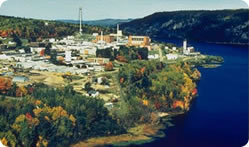by
Lynn Shapiro, Writer | August 14, 2009

The NRU reactor at
Chalk River is offline till 2010
Dealing a blow to downstream suppliers and to the medical community alike, the Atomic Energy of Canada Limited (AECL) said it will not reopen its National Research Universal (NRU) reactor in Chalk River, Ontario until the first quarter of 2010, as a result of repairs that forced the 52-year-old plant to shut down in May.
Since AECL produces approximately 40 to 50 percent of medical isotopes used in North America, the extended shutdown has suppliers scrambling for new sources.
In July, AECL said that the generator would be back online by late 2009. AECL shuttered the 52-year-old reactor in May, after a leak was found in the reactor's vessel.




Ad Statistics
Times Displayed: 45310
Times Visited: 1410 Keep biomedical devices ready to go, so care teams can be ready to care for patients. GE HealthCare’s ReadySee™ helps overcome frustrations due to lack of network and device visibility, manual troubleshooting, and downtime.
The plant is the only one in North America, and one of five in the world, that makes molybdenum-99, which decays to become technetium-99m, an isotope used in an increasing number of medical imaging tests.
Michael Graham, PhD, SNM's President, and director of nuclear medicine at the University of Iowa, commenting on the shortage, told DOTmed News in June that "the bottom line is that patients needing nuclear medicine tests may not get them, and may even have to undergo exploratory surgery in some cases."
He noted radioisotopes are used for such tests as: looking at blood flow in the heart; for bone scans, and for many other studies, like lung scans and uptake of excretion in the kidneys.
Nine Sites Need Repair
AECL said in a statement that it the agency is dedicated to reopening its reactor as soon as possible, but that "detailed analysis of .... data collected confirms nine sites likely requiring repair. AECL says that high resolution scanning data available recently has identified both wall thinning and localized pitting that suggests different corrosion effects.
"This data points to the need to better understand the nature of the corrosion mechanism," the agency says. "As a result, AECL is considering further testing by taking samples from the vessel wall in order to provide more comprehensive data. Third party corrosion experts have been consulted and will provide feedback," the agency says.
Weld Build-up Technique
The AECL says that it is considering applying a technology known as the "weld build-up technique" over a broader area or band at the inside base of the reactor vessel wall, which will address all nine of the sites that have been identified. "In view of the number and locations of the repair sites, the band weld build-up application may be a more efficient and durable way to proceed in repairing the reactor vessel."
Alternative Technique

